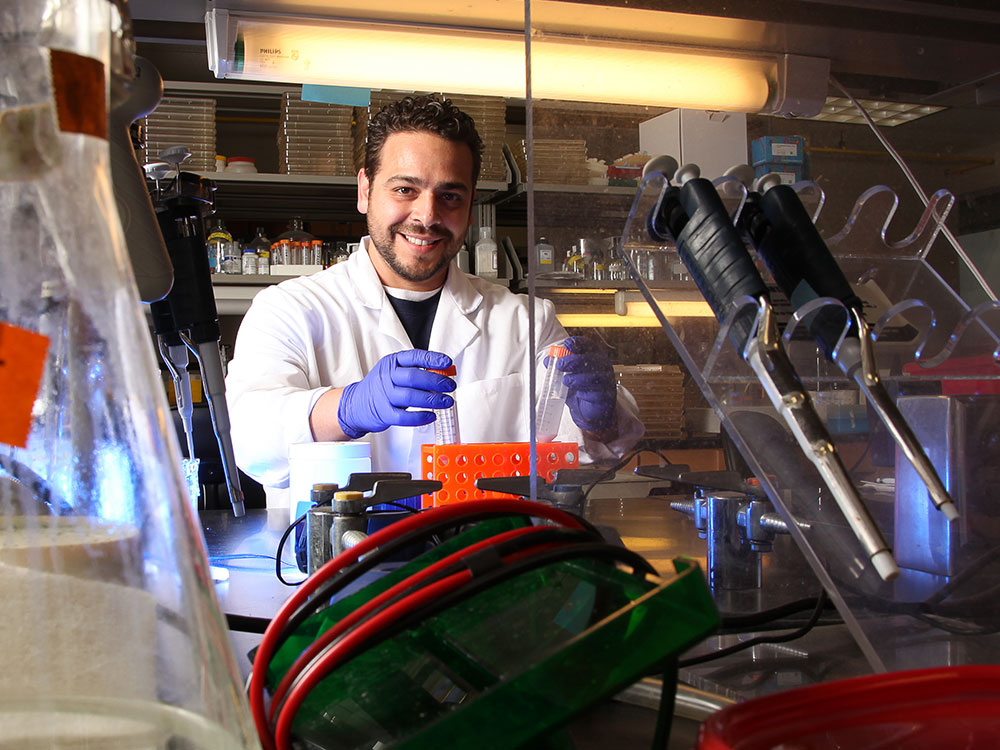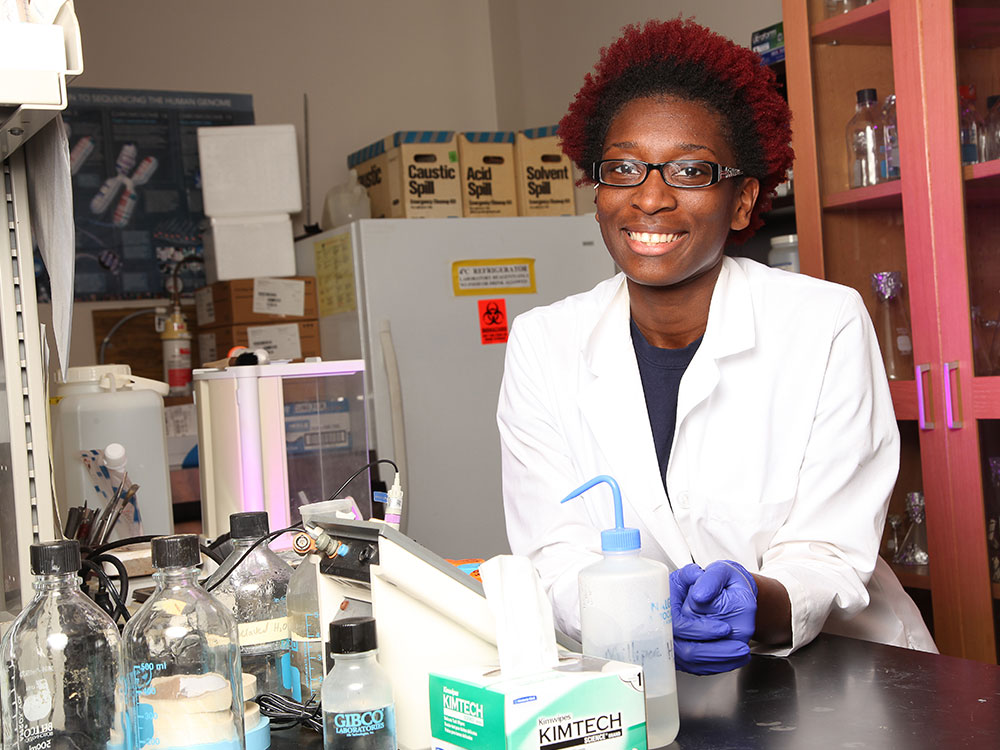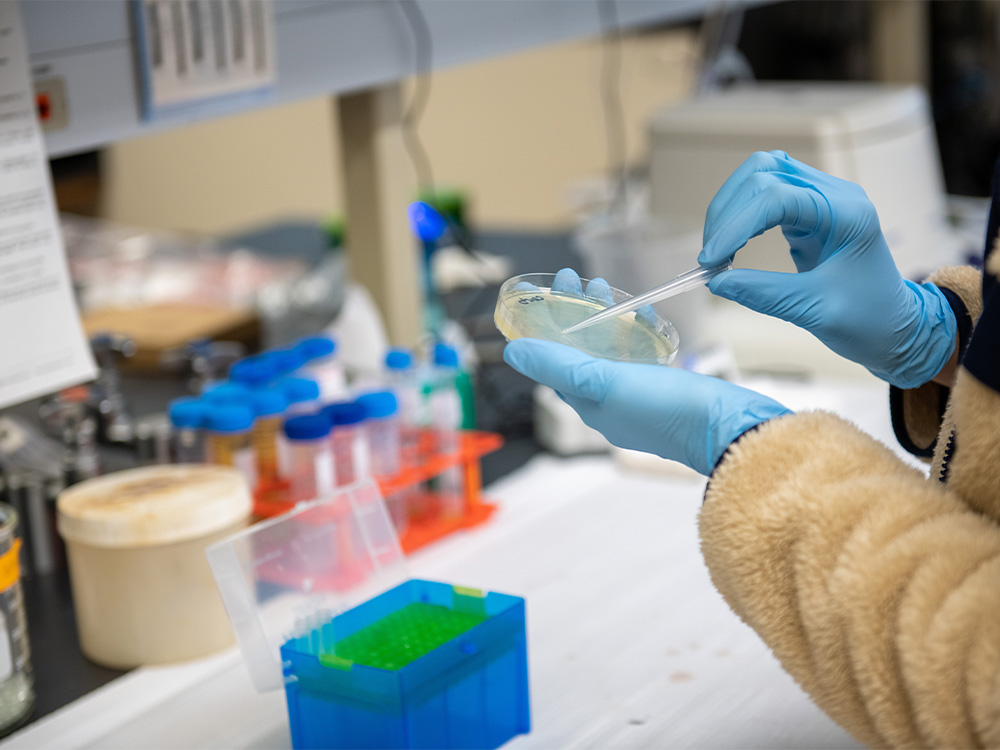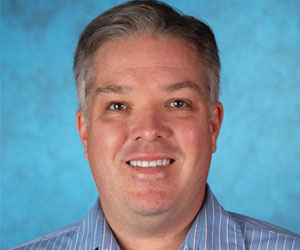
Why Pursue a PhD in Developmental and Regenerative Sciences
The PhD in Developmental and Regenerative Sciences (DRS) will have you pioneer novel discoveries in rapidly developing disciplines and will provide foundational training to operate the latest medical technology. Conduct innovative research at the intersections of modern subdisciplines and methodologies, which includes the fields of molecular biology, cell biology, and experimental techniques in biology.

Program Highlights
- A structured curriculum that ensures efficient and productive matriculation through the program
- Research-intensive, interdisciplinary training experience
- Diverse laboratories with broad research interests in basic, applied, clinical, academic, biotechnology, and military-health research
- 6 State-of-the Art Research Core Facilities featuring cutting-edge instrumentation and technologies
- 32 Research Centers and Institutes
- Students fully and competitively funded throughout the program
- A nurturing environment that promotes student success
- Emphases on excellence, integrity, inclusion, and diversity

Award-Winning Faculty
See what some of our faculty are researching:
- Dr. Lindsey Macpherson, assistant professor of neuroscience and developmental and regenerative biology, received a three-year, $450,000, Voelcker Fund Young Investigator Award to pursue novel research on why people lose their sense of taste during chemotherapy.
- Dr. Brian Hermann, professor of stem cell biology, studies the basic biology of spermatogonial stem cells (SSCs), which are adult-tissue stem cells responsible for sperm production in the mammalian testis and which are essential for male fertility.
Admission & Application Requirements
Applications are submitted through the UTSA Graduate Application. Please upload all required documents (listed below) on your UTSA Graduate Application. It is the applicant’s responsibility to ensure completion and submission of the application, a nonrefundable application fee, and all required supporting documents are on file with UTSA by the appropriate application deadline.
| Developmental and Regenerative Sciences (PhD) | ||
|---|---|---|
| Admission is only available for the Fall semester | ||
| Required Degree | Bachelor's Degree from an accredited college or university in the United States or have proof of equivalent training at a foreign institution. | |
| Minimum GPA | 3.0 (on a 4.0 scale) Departments may consider GPA of last 60 semester credit hours | |
| Coursework | 18 credit hours in an area related to this graduate degree and at least 12 hours must be at the upper-division level. | |
| Transcripts* | Required from all institutions attended; international transcripts must be recorded/translated to English | |
| Credential Evaluation | Required if you have earned university-level credit from foreign institutions. Submit an evaluation of your transcripts from Educational Credential Evaluators (ECE) directly from the graduate admission application platform | |
| English Language Proficiency | 550 TOEFL Paper / 79 TOEFL Internet / 6.5 IELTS / Duolingo 100 | |
| Purpose Statement | Required | |
| Letters of Recommendation | 3 academic or professional reference(s) demonstrating your attributes for successful completion of this program (you will request these through the Graduate Admissions Application; let your recommenders know of your deadline to ensure submissions are on time) | |
| *Unofficial transcripts will be taken into consideration for admissions; however, if admitted into the program, you must submit official transcripts to the University. | ||
Application Deadlines
Applicants are encouraged to have their admission file completed as early as possible. All applications, required documents and letters of recommendation, if applicable, must be submitted by 5:00 PM U.S. Central Time on the day of the deadline. Deadlines are subject to change.
| Developmental and Regenerative Sciences (PhD) | |||
|---|---|---|---|
| Timing on Admission Decision: Completed applications will be reviewed for admission after the deadlines below. Decisions will be made and sent to applicants within a few weeks after the review date. | |||
| Application Deadlines for: | Priority | International | Domestic |
| Fall 2024 | December 1 | December 1 | |
| Spring | Not Available | Not Available | |
| Summer | Not Available | Not Available | |
Funding Opportunities
Teaching and research assistantships are offered, as well as research fellowships. DRS PhD students receive an annual stipend (currently $31,000) paid in monthly allotments, plus their tuition is paid and their cost for health insurance in reimbursed.
Career Options
UTSA prepares you for future careers that are in demand. The possible careers below is data pulled by a third-party tool called Emsi, which pulls information from sources like the U.S. Bureau of Labor Statistics, U.S. Census Bureau, online job postings, other government databases and more to give you regional and national career outlook related to this academic program.
While in a doctoral program, a student may earn a master’s degree provided the following conditions are satisfied:
- A student must be admitted to candidacy.
- A student is eligible to receive a master’s degree upon completion of University-wide requirements and any additional degree requirements specific to the program.
- The Doctoral Studies Committee, Department Chair, and the Graduate Associate Dean of the College must recommend students for the degree.
- The student must apply for graduation by the published deadline the semester prior to awarding the doctoral degree.
- All required coursework in the doctoral program at the time of admission to candidacy must have been taken within the previous six years.
- If the master’s degree requires a thesis, the degree cannot be awarded on the basis of the doctoral qualifying examination.
- Students will not be approved for an additional master’s degree in the same field in which an individual has previously received a master’s degree.
The Developmental and Regenerative Sciences PhD curriculum is offered through daytime courses only. Participation in the program is considered a full-time activity.
The curriculum is highly structured to facilitate efficient matriculation during a student’s tenure in the program. The order of courses is shown below. This structured format ensures that students progress in an efficient and timely manner. The program is designed on the basis of a five-year schedule; however, some CMB/DRS Ph.D. students have completed the curriculum in as few as four years, while others have remained in the program for up to six years to complete their dissertation research. The average time required to complete the program is five years.
The qualifying exam requirement is fulfilled in two parts – a set of written qualifying exams taken during the first year in association with the Cell Biology and Molecular Biology core courses, and an oral qualifying exam taken in the spring of the second year based on the student’s dissertation research proposal.
The Department Symposia held at the end of the fall and spring semesters each year feature presentations by second and fourth year DRS PhD students describing progress toward their dissertation research projects and providing additional valuable experience to develop oral presentation skills. A full-length professional seminar is presented by each DRS PhD student in the DRS Seminar Series prior to graduation.
The final doctoral dissertation is defended orally on the basis of a public presentation of the research results followed by a final, private defense of the research conducted by the student and the Dissertation Committee.
The five-year CMB Ph.D. program curriculum is summarized below.
Year 1
Fall Semester
- NDRB 5133 Principles of Cell Biology (3 hrs)
- NDRB 7041 Cell Bio QE* Colloquium (1 hr)
- NDRB 5000-7000 Level Elective Course (3 hrs)
- NDRB 7572 Research Rotation (2 hrs)
* Written Qualifying Exam
Spring Semester
- NDRB 5123 Principles of Molecular Biology (3 hrs)
- NDRB 7041 Mol Bio QE* Colloquium (1 hr)
- NDRB 5223 Principles of Developmental Biology (3 hrs)
- NDRB 7572 Research Rotation (2 hrs)
* Written Qualifying Exam
Year 2
Fall Semester
- NDRB 7143 Principles of Sci. Writing (3 hrs)
- NDRB 5000-7000 Level Elective Course (3hrs)
- NDRB 7041 Colloquium (1 hr)
- NDRB 7212 Doctoral Research (2 hrs)
- Submit written dissertation proposal as application for extramural funding
- Oral Qualifying Exam will be based on the written dissertation proposal and will be completed by May 30 of second year
- Advancement to Candidacy
Spring Semester
- NDRB 5000-7000 Level Elective Course (3hrs)
- NDRB 7113 Principles of Scientific Teaching (3 hrs)
- NDRB 7041 Colloquium (1 hr)
- NDRB 7212 Doctoral Research (2 hrs)
Year 3
Fall Semester
- NDRB 7313 Doctoral Dissertation (3 hrs)
- NDRB 7313 Doctoral Dissertation (3 hrs)
- NDRB 7312 Doctoral Dissertation (2 hrs)
- NDRB 7041 Colloquium (1 hr)
Spring Semester
- NDRB 7313 Doctoral Dissertation (3 hrs)
- NDRB 7313 Doctoral Dissertation (3 hrs)
- NDRB 7312 Doctoral Dissertation (2 hrs)
- NDRB 7041 Colloquium (1 hr)
Year 4
Fall Semester
- NDRB 7313 Doctoral Dissertation (3 hrs)
- NDRB 7313 Doctoral Dissertation (3 hrs)
- NDRB 7312 Doctoral Dissertation (2 hrs)
- NDRB 7041 Colloquium (1 hr)
Spring Semester
- NDRB 7313 Doctoral Dissertation (3 hrs)
- NDRB 7313 Doctoral Dissertation (3 hrs)
- NDRB 7312 Doctoral Dissertation (2 hrs)
- NDRB 7041 Colloquium (1 hr)
Year 5
Fall Semester
- NDRB 7313 Doctoral Dissertation (3 hrs)
- NDRB 7313 Doctoral Dissertation (3 hrs)
- NDRB 7312 Doctoral Dissertation (2 hrs)
- NDRB 7041 Colloquium (1 hr)
- Full-Length Seminar in DRS Seminar Series
- Dissertation Defense
Spring Semester
- NDRB 7313 Doctoral Dissertation (3 hrs)
- NDRB 7313 Doctoral Dissertation (3 hrs)
- NDRB 7312 Doctoral Dissertation (2 hrs)
- NDRB 7041 Colloquium (1 hr)
Summers
Summer Coursework
- Students will enroll in NDRB 7213 Doctoral Research (3 hrs) during each summer following years 1 and 2
- Students will enroll in NDRB 7313 Doctoral Dissertation (3 hrs) following years 3 and 4 and, if necessary, year 5.


